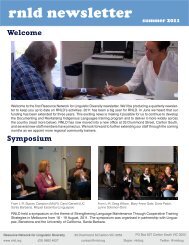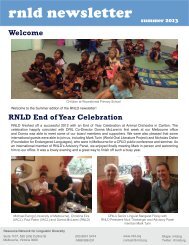The ethnography of language and language ... - Linguistics
The ethnography of language and language ... - Linguistics
The ethnography of language and language ... - Linguistics
Create successful ePaper yourself
Turn your PDF publications into a flip-book with our unique Google optimized e-Paper software.
118 Jane H. Hill<br />
<strong>of</strong> speakers <strong>and</strong> addressees, across channels, across affective keys, <strong>and</strong> the<br />
like.<br />
This organization <strong>of</strong> diversity has very practical consequences for our<br />
work. Again, we can note the problem <strong>of</strong> “naturalization” <strong>of</strong> difference. I<br />
never really learned Nahuatl very well when I was working in Tlaxcala, the<br />
reason being that hardly anybody ever spoke it to me until I had been returning<br />
to the communities <strong>of</strong>f <strong>and</strong> on for almost a decade. This seemed<br />
reasonable; I speak halfway decent Spanish, <strong>and</strong> so do they, so it was just<br />
easier for everybody to use that <strong>language</strong> <strong>and</strong> that was how I initially<br />
thought about what was going on. But in fact this was much more than just<br />
a matter <strong>of</strong> “least effort.” People spoke Spanish to any stranger or outsider,<br />
no matter what their native <strong>language</strong> might be. It was quite astonishing to<br />
go to a public market <strong>and</strong> hear obviously indigenous sellers speaking heavily<br />
accented <strong>and</strong> even ungrammatical Spanish to equally obviously indigenous<br />
buyers throughout all the stages <strong>of</strong> the bargaining process until the<br />
very end <strong>of</strong> the event, when the deal was clinched <strong>and</strong> a few words <strong>of</strong> Nahuatl<br />
would be exchanged to express the solidarity that came in the moment<br />
<strong>of</strong> a successful transaction.<br />
<strong>The</strong> sociolinguistic conventions that distributed Nahuatl <strong>and</strong> Spanish<br />
across the local contextual l<strong>and</strong>scape would have had the most pr<strong>of</strong>ound<br />
effect on my fieldwork had I been documenting grammar rather than <strong>language</strong><br />
shift, since they would have made it very difficult for me to hear<br />
certain kinds <strong>of</strong> constructions or access certain lexical domains. I think it<br />
has been shown that gaining a speaking competence in a <strong>language</strong> under<br />
investigation is a prerequisite to truly sensitive description <strong>and</strong> analysis.<br />
But it was very difficult to do that in the Nahuatl communities. I did try,<br />
but without much success. I had the opportunity once to talk to a local veterinarian<br />
who had learned to speak Nahuatl, not only to facilitate his work,<br />
but because he was deeply interested in the <strong>language</strong> <strong>and</strong> its history. He<br />
discovered, however, that people did not respond well to him when he<br />
spoke it to them. He said, “When I speak it, they don’t respect me.” He had<br />
unwittingly run afoul <strong>of</strong> a convention <strong>of</strong> metaphorical switching that involves<br />
the use <strong>of</strong> Spanish even by Nahuatl speakers when they discuss<br />
technical topics, <strong>and</strong>, unfortunately, also <strong>of</strong> linguistic insecurity associated<br />
with Nahuatl, the idea that people who speak it are not as good as people<br />
who speak Spanish. If his interlocutors were relative strangers, he was<br />
probably even insulting them by suggesting that they did not know Spanish.<br />
Finding contexts for speaking the <strong>language</strong> in such circumstances requires<br />
the most careful analysis <strong>of</strong> how the various <strong>language</strong>s in a community are





